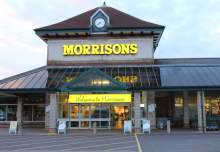Meet Rosine Bekoin, a cocoa farmer and mother of five from Côte d’Ivoire, one of the most important cocoa producing countries in the world.
Four years ago Rosine started selling her cocoa as Fairtrade which means that Rosine now gets a better price for her cocoa, something which has greatly benefited her family:
“I've seen that Fairtrade has helped us a lot in cocoa farming,” says Rosine.
“The Fairtrade Premium has enabled us to do many things, especially women. It has enabled us to advance our children and also we use the Fairtrade Premium to build for the future.”
Good news for growers
The good news for Rosine and for thousands of other farmers and growers who sell their produce as Fairtrade, is that according to the latest Ethical Markets Report published by the Co-operative Group and Ethical Consumer, over the past 12 months sales of Fairtrade products in the UK have increased by almost 15%.
“This is a heart-warming vote of confidence in Fairtrade from shoppers who clearly recognise the benefits of Fairtrade to the producers growing our food,” says Catherine David from the UK's Fairtrade Foundation.
“The pandemic has put enormous pressure on vulnerable farmers and workers this year and consumer support for Fairtrade continues to provide a vital lifeline to producers which will be more important than ever in 2021,” adds David.
The Fairtrade movement has recently been under pressure with sluggish sales, supermarkets setting up rival ethical schemes and multi-national companies such as Nestlé abandoning its commitment to Fairtrade for some of its key brands such as Kit-Kat.
“It's great to Fairtrade sales bounce back during the pandemic after a tricky couple of years,” says Rob Harrison, Ethical Consumer co-editor.
Record high for ethical market
The Ethical Markets Report which has tracked annual ethical expenditure for 21 years, revealed that ethical consumer spending on goods and finance has now reached a record £98bn as of the end of 2019.
Overall the UK's ethical market grew by almost 15%, an increase of almost £11bn between 2018 and 2019 across all categories covered by the report including ethical food and home, travel and transport.
The single biggest increase was seen in the ethical home category which saw an increase of over 45% which was was largely due to E.ON’s decision to move its 3.6 million electricity customers onto renewable tariffs.
“It's encouraging to see the continuing growth of the ethical market,” says Barry Clavin from Co-operative Food.
“This is the 21st consecutive year of sales growth well above inflation and demonstrates an ongoing encroachment of ethical products and services into most retail consumer markets,” adds Clavin.
Whilst the majority of the data in the report covers the period prior to the pandemic, Ethical Consumer commissioned a YouGov survey to assess the impact of Covid-19 on the behaviour of consumers.
This revealed that throughout the pandemic 46% of consumers were shopping more locally, 31% were reducing plastic and 33% were cycling more.
The Ethical Markets Report has been acting as an important barometer of ethical spending across the UK since 1999 by tracking sales data across a wide range of consumer sectors from food to fashion.
For cocoa farmers such as Rosin Bekoin in Côte d’Ivoire, the report is also confirmation that she has the support of shoppers here in the UK.
Photo credit: Chris Terry. The featured image for this article shows Fairtrade cocoa farmer Rosine Bekoin tending her cocoa trees in Côte d’Ivoire.






